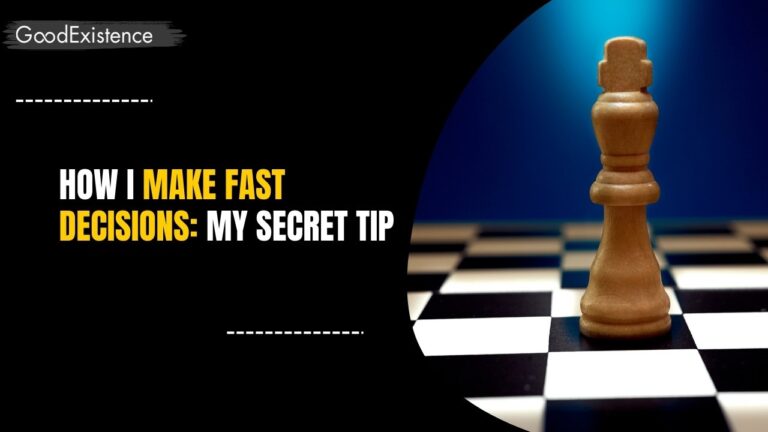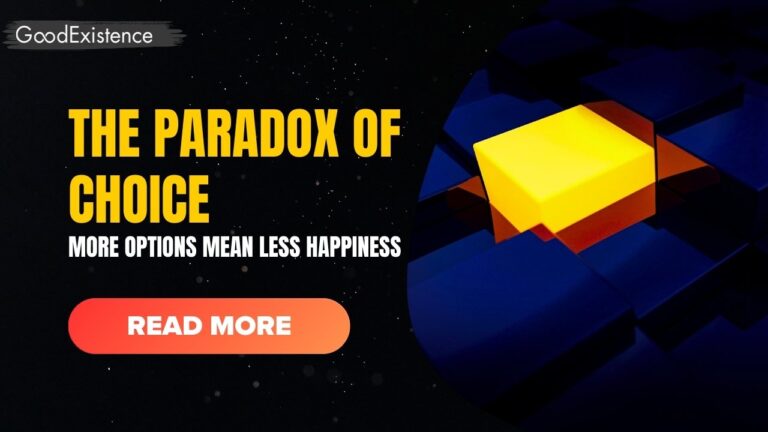
Ever found yourself stuck between two choices? Learn how to be more decisive with practical tips and steps that you can follow. Make life simpler, one decision at a time.
You know the drill:
You’re staring at a restaurant menu, paralyzed by all the choices. Should you go for the chicken parmesan or the grilled salmon?
The internal debate begins…
Before you know it, 15 minutes have passed, and you’re no closer to making a choice. We’ve all been there. So, how do you break the cycle and become more decisive?
Key Takeaways for Becoming More Decisive
- Recognize the Power of Decisiveness: Understand how being decisive reduces stress, boosts happiness, and strengthens relationships.
- Understand Your Decision-Making Style: Identify your natural inclination—quick decisions or thorough analysis—and refine it for better outcomes.
- Set Goals for Clarity: Use clear objectives to simplify and guide your decision-making process.
- Balance Information with Action: Gather necessary information but avoid overthinking to prevent decision paralysis.
- Build Confidence through Practice: Trust in your decision-making grows with each choice, big or small.
- Learn from Failures: View mistakes as valuable lessons for future decisions.
- Trust Your Intuition: Sometimes, your gut feeling is your best guide, based on subconscious processing of past experiences.
Dive into the full article for deeper insights on each point and transform your decision-making process for a more decisive and fulfilling life.
Why Being Decisive Matters

Decisiveness is like a Swiss Army knife – it’s an essential tool you can use in almost every aspect of life.
From small choices like what to eat for breakfast to major decisions like career choices, being decisive can reduce stress and increase your happiness levels.
In fact, decisiveness can even improve your relationships. When you know what you want and are willing to communicate it, people around you also find it easier to make choices that suit everyone involved.
The Science of Indecision
Understanding the neuroscience behind decision-making can help you hack your way into being more decisive.
Sometimes, the brain tries to protect us from making potentially harmful choices, causing us to hesitate.
While caution is good in certain situations, learning how to differentiate between useful and harmful hesitation is crucial.
Knowing when it’s your brain’s self-preservation mechanism kicking in and when it’s mere indecisiveness can make all the difference.
Recognizing Your Decision-Making Style
Understanding your decision-making style can help you identify strengths and weaknesses and adapt your approach accordingly.
Some people are naturally inclined to make snap judgments, while others analyze every angle before making a choice.
Regardless of your style, being aware of it allows you to work on areas where you’re less strong. For instance, if you’re a procrastinator, you could benefit from learning how to act more quickly.
The Power of Setting Goals

Having clear goals in mind is like having a North Star – it guides you in the direction you want to go.
When you have a clear objective, making decisions that align with it becomes much easier.
Goals are not just about the end result; they’re about the journey, too.
Setting smaller milestones along the way helps make the bigger goal less daunting and helps you make more focused decisions.
Related Article: Questions to Ask Yourself When Setting Goals.
Importance of Information Gathering
Before making any decision, gather all the relevant information you need. This doesn’t mean you should drown in details, but having enough knowledge will certainly aid you in making a more informed choice.
While it’s important to collect data, also be aware of biases or misinformation. Always check your sources and make sure you’re working with accurate and unbiased information.
Avoiding Overthinking
Paralysis by analysis. Sound familiar? Overthinking can make any decision seem monumental.
Learn how to draw the line between adequate planning and going down the rabbit hole of endless possibilities.
One way to avoid overthinking is by setting a deadline for the decision-making process. It creates a sense of urgency and helps you move forward.
Cultivating Self-Confidence

Self-confidence is not just about feeling good; it’s about being more decisive. As you begin to trust yourself more, decision-making becomes easier.
Self-confidence grows with practice and experience.
Every time you make a decision, you’re essentially building up your ‘confidence muscle,’ making it easier to face bigger decisions in the future. Guess what? It’s okay to make the wrong choice sometimes. Making mistakes is a part of the learning process. Embrace failure as a stepping stone to better decision-making, rather than as a pitfall to avoid. In fact, each failure is an opportunity to learn something new, so don’t be too hard on yourself. Accept it as a part of your personal growth journey. Setting a time limit can force you to make a decision, thereby cutting down on endless pondering. Time limitations create a kind of mental pressure that can help you prioritize your thoughts and make quicker decisions. Of course, not every decision should be rushed, but giving yourself a reasonable timeframe can often lead to better decision-making. Intuition isn’t just some mystical force; it’s your brain rapidly processing information based on past experiences. Sometimes trusting your gut is the best decision you can make. Don’t underestimate the power of your subconscious. It collects a lot of data over time, and while it might not be easy to articulate why you feel a certain way, that instinctive feeling often has merit. You don’t have to start with life-altering decisions. Begin by making smaller choices quickly and confidently. As the saying goes, “Rome wasn’t built in a day.” Likewise, your decision-making abilities will grow stronger with each small step you take. The idea is to build momentum, turning decision-making into a habit rather than a hurdle. A complex decision is just a series of smaller choices. Breaking it down into more manageable parts can make the process less intimidating and more achievable. For instance, if you’re deciding on a career change, start by researching industries that interest you, then narrow down companies, and finally look into job roles. Each small decision adds up to the big one. Ever feel drained after a day full of choices? That’s decision fatigue. Learn techniques to cope with it, so it doesn’t impact your ability to make good decisions. Scheduling tougher decisions for when you’re most alert and keeping simpler ones for when you’re a bit drained can help manage this fatigue. Prioritize and strategize! Sometimes two heads are better than one. Seek feedback from trusted individuals to gain different perspectives. Just don’t let someone else make the decision for you. Remember, the goal of gathering feedback isn’t to seek validation but to gain a more well-rounded view of the situation, making your decision more informed. Like any skill, decision-making improves with practice. The more you exercise this skill, the better you’ll become at making choices that serve you well. Start with smaller decisions and work your way up to the big ones. Consistency is key; the more regularly you practice, the more natural it will become. Being decisive doesn’t mean you’ll always make the perfect choice, but it does mean you’ll make more choices, learn more lessons, and move closer to your goals. So why wait? Start sharpening your decision-making skills today. Yes, being overly decisive can lead to impulsivity. The key is to find a balance between careful planning and prompt action. Start small. Decide what you’ll wear, what to eat, or which route to take to work. The more you practice, the better you’ll get. Emotions can both help and hinder the decision-making process. Being aware of how you feel can guide you toward a more balanced choice. Deep breathing, mindfulness, praying, and stepping away to clear your head can help reduce stress and improve your decision-making abilities. Yes, there are various decision-making apps and frameworks available that can assist you in making more rational choices. Just remember, the final decision is always yours to make.Embrace Failure
Setting a Time Limit
Trust Your Gut
Take Baby Steps

Break It Down
Dealing with Decision Fatigue
The Value of Feedback
Practice Makes Perfect
How to Be More Decisive: Conclusion
How to Become More Decisive – FAQs





